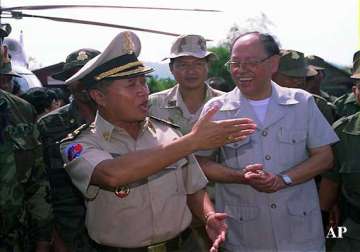Phnom Penh, Mar 14: Ieng Sary, who co-founded the brutal Khmer Rouge movement in 1970s, was its public face abroad and decades later became one of its few leaders to be put on trial for the deaths of an estimated 1.7 million Cambodians, died Thursday morning before the case could be finished. He was 87.
His death before any verdict was reached in the lengthy case dashed hopes among survivors and court prosecutors that he would ever be punished for his alleged war crimes stemming from the darkest chapter in the country's history.
Ieng Sary was being tried by a joint Cambodian-international tribunal along with two other former Khmer Rouge leaders, both in their 80s, and there are fears that they, too, could also die before justice is served. Ieng Sary's wife, former Social Affairs Minister Ieng Thirith, had also been charged but was ruled unfit to stand trial last year because she suffered from a degenerative mental illness, probably Alzheimer's disease.
Lars Olsen, a spokesman for the tribunal, confirmed Ieng Sary's death. The cause was not immediately known, but he had suffered from high blood pressure and heart problems and had been admitted to a Phnom Penh hospital March 4 with weakness and severe fatigue.
"We are disappointed that we could not complete the proceeding against Ieng Sary," Olsen said, adding the case against his colleagues Nuon Chea, the Khmer Rouge's chief ideologist, and Khieu Samphan, an ex-head of state, will continue and will not be affected.
Ieng Sary founded the Khmer Rouge with leader Pol Pot, his brother-in-law. The communist regime, which ruled Cambodia from 1975 to 1979, claimed it was building a pure socialist society by evicting people from cities to work in labor camps in the countryside. Its radical policies led to the deaths of an estimated 1.7 million people from starvation, disease, overwork and execution.
Ieng Sary was foreign minister in the regime, and as its top diplomat became a much more recognizable figure internationally than his secretive colleagues. In 1996, years after the overthrown Khmer Rouge retreated to the jungle, he became the first member of its inner circle to defect, bringing thousands of foot soldiers with him and hastening the movement's final disintegration.
The move secured him a limited amnesty, temporary credibility as a peacemaker and years of comfortable living in Cambodia, but that vanished as the U.N.-backed tribunal built its case against him.
Latest World News

